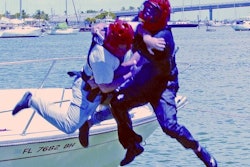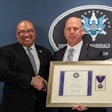Lt. Col. Dave Grossman, U.S. Army Ret., is best known by law enforcement officers as the author of “On Killing” and “On Combat,” and for his passionate support of American warriors. In some other circles, however, he is quite literally known as “Public Enemy Number One.”
Grossman is a crusader against the exposure of children, including teenagers, to violent movies, television, and video games. He is the co-author of “Stop Teaching Our Kids to Kill: A Call to Action Against TV, Movie, and Video Game Violence.”
During a recent conversation with Police editor David Griffith, Grossman discussed his concerns about the entertainment media and its influence on children. The following is an edited transcript of that conversation.
Police: Can you personally watch an action movie that deals with killing in a cartoonish way and see it as just benign entertainment? Or does that repulse you?
I think as adults we can go ahead and make that differentiation. It’s with kids that we need to draw the line. I think as adults, we can watch violence as entertainment. But I think we have to be self-aware. The real debate is not with adults. The real debate is with children, and they don’t have the same ability that we do. Police: We now have these movies like “Saw” and “Hostel” that in my view are nothing more than torture porn. Yet they are rated a standard R, which means that any guardian or parent can bring their kids to these movies.
Even the R rating is poorly enforced. You go to any multi-plex theater and you can buy a ticket to one film and walk into another one.
You make a great point. And we now have the brain scan studies to show what happens to people when they watch these movies. These people are truly intoxicated. And they exist in an intoxicated state. So every generation there is a slice of the public that needs ever more violent movies. They have essentially built up a tolerance to the drug.
Generation after generation we have become more jaded in both psychological and physical terms. The violence now needs to be ever more toxic, ever more vivid for these people to get the rush. And you wonder where the upper limit is. You wonder how much worse it can get.
I think in the 1950s people would have told you then that it couldn’t get much worse. Then in the ’60s with Peckinpah and “The Wild Bunch,” people said, ‘It can’t get much worse than this.’ But in each generation it gets worse and worse.
And again with adults that’s one thing, but when children are choosing to watch that kind of stuff, then somebody’s got to say timeout.
Police: I gotta admit that just the commercials for “Hostel” made me want to crawl under my chair.
And imagine what that’s doing to children.
Police: I’m not that squeamish. I like “Pulp Fiction;” I like Tarantino movies, but torture scenes really make me squirm.
Well, we thought “Pulp Fiction” was as bad as it could get. A few years before that, we thought “Reservoir Dogs” was as bad as it could get. The truth is that Hollywood has got to find something that will punch buttons that haven’t been punched before.
The question is, “How far does the pendulum go before we start swinging back the other way?” And I think it’s gone about as far as it’s going to go.
The dynamic that’s really going to bring about change is the TV turnoff curriculum. Whole school districts are doing this. No TV, no movies, no video games for 10 days. In the school districts that do this, violence goes down, bullying goes down, obesity goes down, and test scores go up.
The combination of the curriculum and the brain scan studies mean that nobody can deny it. I remember when my first-grade teacher told me that cigarettes kill people. I went home and hid my dad’s cigarettes.
Worldwide this curriculum is going in. It’s viral in nature. We’re not going to ban media violence, just like we didn’t ban cigarettes, but we are going to make it harder for kids to see it. We have a generation of kids that are going to grow up and rein in the entertainment industry the way that our generation reined in the tobacco industry.
Police: Do you think we’ll see a rise in torture killings because of movies like “Saw” and “Hostel?”
Absolutely. It’s going to get worse before it gets better. The kids who are partaking of these movies and this generation of video games…We’ve got about 10 bad years in front of us. It’s going to get worse before it gets better. The kids who gave us the all-time record of violent deaths in the schools, will soon give us the all-time record of violent death in the workplace.
Police: You are public enemy number one in the videogame industry.
You know that’s true. In one national magazine the head lobbyist for the videogame industry said that the number one industry objective was to neutralize me. I testified before Congress last summer about this $13 billion a year industry, and they have now declared me public enemy number one.
Police: It reminds me of Dr. Frederic Wertham, the child psychologist who forced the comic book industry to create the now-defunct Comics Code.
The thing that I’ve got going that Wertham didn’t—and I think Wertham was onto something—is the brain scan studies. I think we’re going to go a lot further than Wertham did because things have gotten a lot worse. We now have the Stanford Study and the Stanford curriculum that demonstrates that when half the kids turn off their TVs and videogames, we get effects that we never dreamed of, including a decrease in violence and an increase in test scores.
Police: Officers recently campaigned against a videogame titled “25 to Life.” Do you think that a game like that really makes it more likely that a person would attack a cop?
I’ve talked with friends of mine about that, and it’s kind of interesting. Ask yourself what would happen if that were a game where the whole goal was to hunt down Asians or the whole goal was to kill blacks. I think if it was any other class of society that was portrayed in that game, it would have been banned.
I think the law enforcement community definitely has a right to stand up and say this game is not right. Unfortunately, I think all we’ve done is give them publicity.
Nothing is going to be accomplished by just protesting. There’s only three ways that we’re going to make headway against this industry: education, legislation, and litigation.
We’re making tremendous progress with a case in Alabama. It’s overcome every motion to dismiss. It’s going before a jury. It’s going to be a big deal.
If you’re not familiar with it, it’s the case where we had a 16-year-old boy who bought “Grand Theft Auto” from the local Wal-Mart. He played it every free moment of every day for the next two years. Shortly after his 18th birthday, he steals a car. The cops catch him. Good kid. Good family. Good history. No priors. One joyride. So what’s he looking at, probation? A slap on the wrist? He knows it. But in the booking room, he snatches a cop’s gun and murders the cop. He ambushes the cop’s partner as he comes through the door. He murders the unarmed dispatcher on his way out the door. He steals a police car and goes on a chase.
It’s a scene right out of “Grand Theft Auto.” His left brain shut down, and scripts were poured into his head. In the initial hearing, the judge says to him, “You’re 18, you’ve murdered three men, and you’re facing the death penalty.” And the kid says, “Life is like a videogame. Everybody dies.”
The kid’s been convicted and he’s been sentenced to death, but the prosecutor, the police chief, and the families of the three dead cops are all suing the video game industry. It’s the perfect storm of a case. And the reason why it came to court is that cops I taught made the connection.
The point is that we can protest “25 to Life” until we are all blue in the face, and we won’t accomplish a blasted thing. The only strategy that will accomplish anything is education, legislation, and litigation.
On the legislation front, there have been state laws in Illinois, Michigan, Washington, and California that regulate children’s access to these vile games. But the video game industry has overturned those laws on First Amendment grounds.
The publishers of these games argue that they have the First Amendment right to sell unrated videogames to kids. But that puts them on the horns of a dilemma. Because in the lawsuits, they can’t have it both ways. They can’t overturn the state laws—fight, and kick, and scream over their right to sell this stuff to kids—and then claim that they are not responsible for what happens when kids get their hands on it. So we were stopped on the legislative front, but that just created a vulnerability for the enemy on the litigation front.
The final front, the ultimate transformational tool is education. That’s where the Stanford study comes in. It’s my goal to educate people, and the Stanford study is a true viral phenomenon that’s taken off worldwide. You’ve got to educate people. Once the education comes, the legislation and the litigation will be right behind it.
As long as the video game industry keeps making money, they are going to keep doing it. So what we’ve got to do is create an environment in which they stop making money. That’s the master plan. I’ve been following that plan the last five years. And now we’ve got them on the ropes.
Police: If you were in charge of a television network, what changes in programming would you make?
You know if I was head of a network, I would sell all my stock in the network and buy Brunswick Bowling stock.
Here’s what’s happening, whole school districts are putting this [turn off the TV] curriculum in place. In the first school district that put this curriculum in place, the YMCA gave three 10-day memberships to any family that did the TV turnoff. They gave away more than half-a-million dollars in free memberships, but they got renewal rates like they never imagined. The library had a big sign-up drive. The bowling alleys and the skating rinks were flooded.
As we turn off this stuff, you’ll see a fundamental shift in our society. So if you make me the head of a television network, the first thing I’ll do is try to cut my losses. I would go and pull out all the files and all of the studies. I’m going to go honest, and I’m going to say, “Look, we’ve known since the 1950s that we were killing people, and we know that we’ve done great social harm. I’m the whistle blower.”
The first one of the networks that blows the whistle that goes state’s evidence, that pulls out all the secret files, and does all the things that the tobacco industry should have done if it had been smart back in the early ’60s, they’re going to come out of this thing smelling like a rose. They will be the heroes, and they will be able to redirect their corporate resources toward the things that will be financially successful.
Police: You are the co-author of science-fiction books that are military science fiction, so in that since they are violent. Would a film made from one of your books teach kids to kill?
That’s entirely possible. I haven’t been faced with the moral dilemma of someone wanting to turn one of my books into a film, but the truth is that the written word and the spoken word are totally different than visual imagery marketed to kids. I personally would not be supportive of them making a movie out of one of my books. It’s not something that I would want to be involved in.
You know it’s funny, when “On Killing” came out I had an offer from Playboy to do an interview and to serialize parts of the book. I told them, “No.” I just wasn’t interested in being associated with Playboy magazine. Playboy is pretty benign, pretty mild. But I just didn’t feel like my presence in the magazine would foster the overall goals that I was trying to accomplish. I’ve been quite happy with that decision.
And it’s very important that everyone understand that we’re not talking about book burning here. The written word exercise, the spoken word exercise are what makes us human. We’re not talking about free speech. We’re talking about visual imagery marketed to children. That’s a totally different product. It’s like alcohol, tobacco, pornography, and firearms. It’s a product that society should say adults can have that kids can’t have, but adults can.












